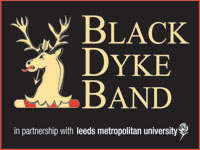Black Dyke Band
28-Jan-20072007 RNCM Festival of Brass
Conductor: Dr. Nicholas Childs
Soloists: Richard Marshall, Bridget Budge
RNCM
Friday 26th January
 The Black Dyke Band opened the 2007 RNCM Festival of Brass with a demanding programme of music that featured performances of Elgar, Wilby, Aagaard Nilsen, Howarth and Ball. Although the Festival itself tends towards the inclusion of more contemporary works, the reigning British Open Champions opted to showcase repertoire that spanned three centuries of composition.
The Black Dyke Band opened the 2007 RNCM Festival of Brass with a demanding programme of music that featured performances of Elgar, Wilby, Aagaard Nilsen, Howarth and Ball. Although the Festival itself tends towards the inclusion of more contemporary works, the reigning British Open Champions opted to showcase repertoire that spanned three centuries of composition.
Prior to the concert, Philip Wilby chaired a pre concert talk to over 150 people in the small lecture theatre adjoining the Haden Freeman Concert Hall, where joined by Dr Nicholas Childs and Anthony Payne, the composer and arranger of the nights first work, Elgar's ‘Pomp and Circumstance March No 6 in G Minor,' they delivered an enjoyable and insightful analysis of the works to played on the night. This welcome addition to the Festival allowed for extended insight and Anthony Payne in particular revealed much about the pleasure gained as well as the difficulties faced when reconstructing the fragments of Elgar's last P&C (as he described it) March. It certainly left the audience better informed, and crucially, more aware and receptive to what they were about to hear.
A near capacity audience sat in expectation as Dyke took to the stage. The March (although at over 8 minutes it would take a bit of playing at Whit Friday) opened the evening and showed itself to be a masterful, intuitive realization of Elgarian intentions. Payne was of course the architect behind the magnificent orchestral reconstruction of Elgar's unfinished ‘3rd Symphony', so this was perhaps a more straightforward piece of archeological jigsaw work.
Elgar's March series is an acquired taste – the epitome of Edwardian restraint and repressed emotion, they echo a time of Empire, patronage and a disciplined convention. The pomp is there to be seen, the circumstance to be respected and revered rather than joyously celebrated, and this was captured to perfection with a neat sense of closure revealed in the closing bars with a backward glance to the opening flourishes of the more famous 1st March of the series.
There were certainly no backward glances with the Aagaard- Nilsen ‘Cornet Concerto' – a fearsome tour de force of immense proportions for the soloist Richard Marshall.
His was an immense performance too of the three movement work, that although modernist in approach was still easily and enjoyably accessible. In some ways it was a linear extension of the form heard in the celebrated Tomlinson ‘Concerto' with a fanfare like opening movement followed by a dark hued emotional second and a more joyous almost jazz inspired third. A wonderful work of clarity of thought and purpose it was delivered in masterful fashion by a performer on the very top of his form.
Another bit of Elgar followed, although this was Elgar Howarth's ‘Boddington Variations' – a much more liberal work of post War deconstructed tendencies and a celebration of one of the true conducting greats of the brass band movement, Stanley Boddington.
Based around a five note musical syllable signature of his name, his favourite hymn tune, ‘Repton' and a slightly more enigmatic Howarth notational fingerprint (more readily heard in the opening cornet statement in ‘In Memoriam RK') it is an affectionate work of substance and fearsome musical challenges (especially the opening). Each of the eight variations develops the musical portrait of the conductor with an acute observational eye to his character as well as his musical achievements (there is a lovely oblique reference to ‘Variations on a Ninth' – on which the GUS Band won the Nationals in 1964).
It is in turn witty and emotional – and very demanding, and Dyke produced a thoughtful and musical account that although not lacking in error, revealed the work in its true splendour as a major composition with immense potential for the contest stage too. It won't be an occasional work of substance.
After the short interval Dyke returned with Eric Ball's ‘Resurgam' in a performance that was enhanced by an emotive, rather than over emotional interpretation from the MD. It is sometimes forgotten that the piece is a paean of repressed emotion of over death of the composer's sister in law, a lament of innocent understanding of death and resurrection. Too often that innocence is ignored and replaced by over wrought emotion, so it was a welcome to hear such subtly of understanding in a notable performance.
The second Elgar celebration saw Dyke joined on stage by two harpists, organ and the mezzo soprano Bridget Budge for a performance of his ‘Sea Pictures Op 37' arranged by Philip Wilby.
Once more Wilby's intuitive approach brought colour and delicacy to the music (intelligently enhanced by extensive use of mutes) and each of the five collective songs retained their character, if dated poetic context.
Finally, ‘Vienna Nights' which certainly has immense character and context, and which, at the end of a grueling work out for the band was given a rousing and at times quite riveting performance. Not everything was as it should have been in places, but even at the end of such an exhausting concert, there were still enough in the tank to get the hairs on the back of your neck standing on end.
An encore of Paul Lovatt Cooper's ‘Where Eagles Sing' rounded off things with a touch of spice to what had been a concert of high quality and musical insight.
Iwan Fox









